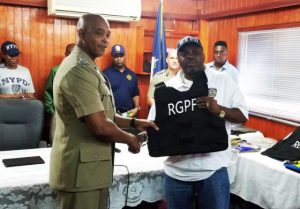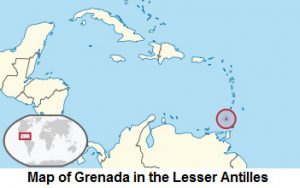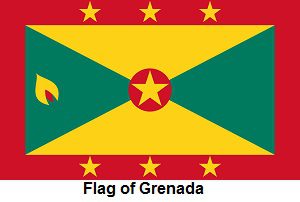Go Lean Commentary
Who you gonna call?
This question can be asked throughout the Caribbean. There is an emergency, a threat to life and property, who do you call? The answer should be the Police.
 But who would the Police call when they have a problem?
But who would the Police call when they have a problem?
It is hoped that there would be some regional entity that steps in, steps up and helps out.
There is such a need!
This was the scenario in Grenada, just recently. They had a security need above and beyond the local provisioning, and the Royal Grenada Police Force turned to the Grenada Diaspora.
This is perplexing! Let’s examine this further. See the full news article here:
Title: NYPD officers with Caribbean roots reach out to aid the region
(NY Daily) The NYPD-RGPF Officers’ Association — a group of NYPD officers with roots in Grenada — is bringing new meaning to the phrase “long arm of the law” by reaching out to help Grenada law enforcement officials and aiding other causes in the region.
This month, the association collected much-needed relief supplies — including food, soap and shoes — for survivors of Hurricane Maria on storm-ravaged Dominica. Association members were scheduled to gather in Brooklyn yesterday to pack donated supplies bound for Dominica.
The NYPD-RGPF association was founded in the wake of tragedy and its members are, professionally and personally, well suited to respond to crisis.
According to NYPD-RGPF spokesman Michael Bascombe, the association — which uses the Royal Grenada Police Force acronym RGPF in its name — was founded after RGPF Corporal Daniel Edgar was fatally shot in the line of duty in Grenada in April 2016.
Through fund-raising efforts and personal financial support from NYPD officers, the association’s first act was a financial contribution to Edgar’s family — and donating 100 bullet-proof vests, helmets, traffic enforcement equipment and other gear to the Grenada Police Force in September.
The association has started discussions with the RGPF on possible future partnerships, he said.
Source: Posted October 30, 2017; retrieved November 2, 2017 from: https://stluciatimes.com/2017/10/30/nypd-officers-caribbean-roots-reach-aid-region
Make no mistake; Grenada needs all the help it can get. All of these Caribbean member-states need whatever help they can get. The region is reeling from the near total devastation from Category 5 storms: Hurricane Maria and Hurricane Irma; Dominica is in disarray! Barbuda is wiped out and declared a Ghost Town as a result. These places must relieve, restore, recover and rebuild.
Who they gonna call?
The urging here is to NOT look to the Diaspora as some panacea, cure-all solution. This is definitely what is happening in Grenada, as this foregoing news article related:
The NYPD-RGPF association was founded in the wake of tragedy and its members are, professionally and personally, well suited to respond to crisis.
This is a troubling point here: we cannot look to people who have left here to turn around and fix what is broken here. They – the Diaspora – are gone! Yet, this is the preponderance for governments (and citizenry alike) to pursue this strategy in the region. Just recently we published commentaries on this Caribbean pre-occupation, with these entries relating these homelands:
- Dominica – October 18, 2017 – https://goleancaribbean.com/blog/?p=13288
- Haiti – September 30, 2017 – https://goleancaribbean.com/blog/?p=13105
- Jamaica – September 20, 2017 – https://goleancaribbean.com/blog/?p=13040
- Bahamas – September 4, 2017 – https://goleancaribbean.com/blog/?p=12911
- St. Lucia – March 3, 2017 – https://goleancaribbean.com/blog/?p=10657
The premise for the criticism of this Diaspora strategy is that the ones that have fled the region have done so for a reason; they have been “pushed” or “pulled” away from their homeland. They may still love their “past” country, but can only do so much from abroad. Plus, history documents that they are less inclined to invest back in their country; they are burdened with the concerns of today and the future, that it is illogical to think that they are concerned about their yesterdays. Thusly, all efforts to outreach the Diaspora are usually futile. All of these prior commentaries relate this basic truth about catering to the Diaspora:
The subtle [Diaspora outreach] message to the Caribbean population is that they need to leave their homeland, go get success and then please remember to invest in us afterwards.
… It is so unfortunate that the people in the Caribbean are beating down the doors to get out of their Caribbean homeland, to seek refuge in these places like the US, Canada and Western Europe. … As a result, we have such a sad state of affairs for our Caribbean eco-system as we are suffering from a bad record of societal abandonment.
Thank you, all Diaspora members that have looked back and lent a hand, but the heavy-lifting of reforming and transforming our society must really come from the people who are in the homeland and in the region. For starters, we must try to dissuade people from leaving in the first place and help them to prosper where planted. The record shows that those who do leave, tends to be the ones that we can least afford to lose. These include the professional classes and highly educated ones; one report presents an abandonment rate of 70 percent of the college-educated populations.
Picture a family with limited food supply, serving dinner and “making extra plates” for family members who have left or passed. This would be illogical. We need to be more pragmatic and work a different strategy to assuage our crisis. We need a strategy that embraces those who are still here, not those that “used to be”.
So the problem of a Diaspora-outreach strategy is that it double-downs on the failure of why the Diaspora left in the first place. We need to employ new strategies for the underlying failures. When we look at our Caribbean homeland and see the many failures, we realize that the people on some islands – like Grenada – and the people in their Diaspora cannot solve the problems in the homeland … alone. No, something bigger and better is needed.
We need a Way Forward. This is where and why we have introduced that something BIGGER … and better …
… enter the Caribbean Union Trade Federation (CU). This is presented as the organizational solution for the economic, security and governing needs of all 30 Caribbean member-states, including Grenada; this is the panacea the region needs.
The foregoing article addressed security issues and law-and-order. The book Go Lean…Caribbean – available to download for free – serves as a roadmap for the introduction and implementation of the technocratic CU, for the elevation of Caribbean societal engines – including economic, security and governance for all member-states. The book asserts that the region can do better with security solutions. We can make our region better and safer to live, work and play. But the requirement is that we must work together – in a formal regional integration – to establish the economy-of-scale to employ the many strategies, tactics and implementation to remediate and mitigate crime in the homeland.
In fact, the CU/Go Lean roadmap presents these 3 prime directives:
- Optimization of the economic engines in order to grow the regional economy to $800 Billion and create 2.2 million new jobs. There are limited economic opportunities in Grenada today, but a regional reboot can create a new industrial landscape with long-sought job and entrepreneurial opportunities.
- Establishment of a security apparatus to ensure public safety and protect the resultant economic engines. This includes many anti-crime measures, plus the proactive and reactive empowerments to better relieve, restore, recover and rebuild from hurricanes.
- Improvement of Caribbean governance to support these engines, including regional integration with a separation-of-powers between each state and CU
The goal of the Go Lean roadmap is for Caribbean people to prosper where planted; the book therefore provides 370-pages of turn-by-turn instructions on “how” to adopt new community ethos, plus the strategies, tactics, implementations and advocacies to execute so as to reboot the region’s societal engines, for Grenada and other member-states. One advocacy for a Way Forward is the plan to optimize community policing (Page 178); see the headlines and excerpts from that page here:
10 Ways to Remediate and Mitigate Crime
| 1 | Lean-in for the Caribbean Single Market This will allow for the unification of the region into one market of 42 million people across 30 member-states, thereby creating an economic zone to promote and protect the interest of the member-states. (The GDP of the region will amount to $800 Billion according to 2010 figures). In addition, the treaty calls for a collective security agreement of the Caribbean nations so as to implement provisions to serve and protect the citizenry against systemic threats. The CU’s law enforcement agencies will enforce, investigate and prosecute economic crimes, including Racketeering, and Organized Crime Enterprises (RECO), plus any cross border gang activity. In addition, the CU will also provide funding, grants, training, technical consultancy, and support services for member-states law enforcement, including crime labs. |
| 2 | Deploy the Caribbean Police (CariPol)
The CU Treaty will compel local police to have accountability and respect for the jurisdiction of the Caribbean Police. CariPol will be modeled after Interpol and the US FBI, with Inspectors for investigations and Marshalls for protection and interdiction. When the local Police call for escalation, CariPol responds. CariPol also “polices” the Police, with audit and compliance oversight for “use of force” reviews and Internal Affairs. The appeal to engage CariPol does not have to come from local police, but rather any constitutional institution (i.e. state governments, courts, or legislative bodies). |
| 3 | Regional Security Intelligence Bureau
The CU law enforcement apparatus will deploy sophisticated intelligence gathering and analysis systems, processes and personnel. This includes terrestrial and satellite surveillance (CATV, ankle monitoring) systems, eavesdropping, data mining and predictive modeling. Local and regional Police institutions would have access to these findings and results. The CU’s intelligence agency will also monitor police actions for public integrity assurance (corruption threats). |
| 4 | Prison Industrial Complex |
| 5 | Equip local police with advanced technologies
The CU will provide grants to equip local police with advanced technologies, including video (dashboard cameras) and audio transmission, GPS tracking, and mobile computing systems to optimize community policing. The advanced systems also include anklet monitoring systems for non-violent offenders and suspects out on bail. |
| 6 | Witness Protection |
| 7 | Enable the Private Industry of First Responders and Bounty Hunters |
| 8 | Hate Crime Qualifiers |
| 9 | Youth Crime Awareness and Prevention |
| 10 | Death Penalty Reform |
 Bullet Proof vests are necessary equipment for community policing. The foregoing news article, and VIDEO in the Appendix below, related that the Diaspora group, the NYPD-RGPF, “donated 100 bullet-proof vests, helmets, traffic enforcement equipment and other gear to the Grenada Police Force in September”. Frankly, this is a local government responsibility. The fact that there is the need for this gift in Grenada is reflective of the security deficiencies in that country and in the region. If the community stakeholders cannot protect their own Peace Officers, how much more so can they protect the citizenry. See this sage commentary:
Bullet Proof vests are necessary equipment for community policing. The foregoing news article, and VIDEO in the Appendix below, related that the Diaspora group, the NYPD-RGPF, “donated 100 bullet-proof vests, helmets, traffic enforcement equipment and other gear to the Grenada Police Force in September”. Frankly, this is a local government responsibility. The fact that there is the need for this gift in Grenada is reflective of the security deficiencies in that country and in the region. If the community stakeholders cannot protect their own Peace Officers, how much more so can they protect the citizenry. See this sage commentary:
Intentionally murdering a police officer is an especially heinous crime. When the agents of the state who protect the public are themselves targeted, it is a threat to public order and an attack on the authority of the state. Such crimes ought to be penalized more harshly throughout the entire country. – National Review Magazine.
 The Caribbean has mourned the death of a Police Office in Grenada. The Caribbean is not the only region that have experienced violent crime … against law enforcement officers and other citizens. In fact, in the US, the rate of death from gun violence far exceeds all other advanced democracy countries. Yet, our Caribbean Diaspora – from New York City – has stepped in to help Grenada.
The Caribbean has mourned the death of a Police Office in Grenada. The Caribbean is not the only region that have experienced violent crime … against law enforcement officers and other citizens. In fact, in the US, the rate of death from gun violence far exceeds all other advanced democracy countries. Yet, our Caribbean Diaspora – from New York City – has stepped in to help Grenada.
Thank you …
… but we are urged to lower our expectations of gifts and investments from the Diaspora in general.
The Go Lean book – and many previous blog-commentaries – asserts that while conditions may be bad for Caribbean residents (i.e. Grenadian) in their homeland, Black-and-Brown immigrants to far-away countries (think: North America and Western Europe; think New York City) often have to contend with less than welcoming conditions in those countries. It is only with the Second Generation that prosperity is achieved, but by then, the children of the Caribbean Diaspora are not considered “Caribbean” anymore; they assume their residential citizenship.
When Caribbean people in general, and Grenadians in particular, emigrate and become aliens in a foreign land, life is not necessarily better in those countries. As related in these prior blog-commentaries, those who live in the Diaspora know “both sides of the coin”, as most of them have lived in the ancestral lands at one point. But on the other half, those who still live in the homeland may have never lived abroad.
They do not know what they do not know!
Being a visitor to some North American or European city is different than being a resident, as visitors do not have the interactions of applying for jobs, housing, government benefits, paying taxes, co-existing with neighbors, etc.. These ones in the homeland may naturally assume that the “grass is greener on the other side”. Here’s the truth:
It is not! (The grass in the northern cities may not even be green at all; it may be covered with autumn foliage or snow).
So it is the summation of this commentary and all the related ones with the theme “Diaspora – Not the Panacea” that it is better for Grenadian people, and people of all the Caribbean for that matter, to work to remediate and mitigate the risks of Failed-State status in their homeland. But many people may argue – and they would be correct – that the reformation and transformation of Caribbean communities should come from Caribbean people first. Yet with such a high societal abandonment rate, the population of many Caribbean member-states – as in Grenada – is approaching a distribution where more citizens live abroad – in the Diaspora than on the island. See the additional data references here:
Grenada, like many of the Caribbean islands is subject to a large amount of migration, with a large number of young people wanting to leave the island to seek life elsewhere. With estimated 107,317 people living in Grenada, estimates and census data suggest that there are at least that number of Grenadian-born people in other parts of the Caribbean (such as Barbados and Trinidad) and at least that number again in First World countries. Popular migration points for Grenadians further north include New York City, Toronto, the United Kingdom (in particular, London and Yorkshire; see Grenadians in the UK) and sometimes Montreal, or as far south as Australia. This means that probably [ONLY] around a third of those born in Grenada still live there.- Wikipedia.
The Go Lean roadmap is not one that advocates the Diaspora coming to the rescue, but rather a Caribbean confederacy, constituted by all 30 member-states, being the solution. This roadmap leverages the Caribbean as a Single Market (42 million people); it asserts that this is better than just catering to the Diaspora of just one country. This is to be the panacea that Caribbean needs to assuage its defects and dysfunctions. Plus, it also includes the Diaspora, but for all the Caribbean nations combined – estimated at 10 to 25 million. This is a plan for interdependence! This was the initial motivation for the CU/Go Lean roadmap, as pronounced in opening Declaration of Interdependence (Pages 12 – 13) statements of the book:
x. Whereas we are surrounded and allied to nations of larger proportions in land mass, populations, and treasuries, elements in their societies may have ill-intent in their pursuits, at the expense of the safety and security of our citizens. We must therefore appoint “new guards” to ensure our public safety and threats against our society, both domestic and foreign. The Federation must employ the latest advances and best practices of criminology and penology to assuage continuous threats against public safety. The Federation must allow for facilitations of detention for convicted felons of federal crimes, and should over-build prisons to house trustees from other jurisdictions.
xi. Whereas all men are entitled to the benefits of good governance in a free society, “new guards” must be enacted to dissuade the emergence of incompetence, corruption, nepotism and cronyism at the peril of the people’s best interest. The Federation must guarantee the executions of a social contract between government and the governed.
xvi. Whereas security of our homeland is inextricably linked to prosperity of the homeland, the economic and security interest of the region needs to be aligned under the same governance. Since economic crimes, including piracy and other forms of terrorism, can imperil the functioning of the wheels of commerce for all the citizenry, the accedence of this Federation must equip the security apparatus with the tools and techniques for predictive and proactive interdictions.
xix. Whereas our legacy in recent times is one of societal abandonment, it is imperative that incentives and encouragement be put in place to first dissuade the human flight, and then entice and welcome the return of our Diaspora back to our shores. This repatriation should be effected with the appropriate guards so as not to imperil the lives and securities of the repatriated citizens or the communities they inhabit. The right of repatriation is to be extended to any natural born citizens despite any previous naturalization to foreign sovereignties.
xx. Whereas the results of our decades of migration created a vibrant Diaspora in foreign lands, the Federation must organize interactions with this population into structured markets. Thus allowing foreign consumption of domestic products, services and media, which is a positive trade impact. These economic activities must not be exploited by others’ profiteering but rather harnessed by Federation resources for efficient repatriations.
There have been a number of blog-commentaries by the Go Lean promoters that have detailed the functionalities of the CU‘s security measures as part of the Way-Forward – the best hope for a new eco-system for Grenada, and the whole Caribbean. See a sample list here of recent submissions:
| https://goleancaribbean.com/blog/?p=13138 | Industrial Reboot for Better Security – Prisons 101 |
| https://goleancaribbean.com/blog/?p=13126 | The Requirement for Better Policing/Security – ‘Must Love Dogs’ |
| https://goleancaribbean.com/blog/?p=12400 | Strong Urging to Accede the Caribbean Arrest Treaty |
| https://goleancaribbean.com/blog/?p=11244 | Gun and Violent Deaths More Common in USA Than Caribbean |
| https://goleancaribbean.com/blog/?p=10566 | Funding the Caribbean Security Pact |
| https://goleancaribbean.com/blog/?p=9072 | Securing the Homeland – A Series |
| https://goleancaribbean.com/blog/?p=7485 | A Lesson in the History of Interpersonal Violence – Street Crimes |
| https://goleancaribbean.com/blog/?p=2684 | Role Model for Justice – The Pinkertons |
| https://goleancaribbean.com/blog/?p=392 | World Bank Funds Caribbean Country to Help in Crime Fight |
Confederating a regional response is by all means the best-practice for Grenada and other Caribbean security threats. Good results are evident from the limited multilateral efforts that have been exerted thus far. In fact, the current Caribbean Community – CARICOM – includes this regional anti-crime organization IMPACS. The formal name is actually CARICOM Implementation Agency for Crime and Security.
See the “Fact Sheet” in the Appendix below.
This IMPACS organization tries …
… but trying alone is not enough. There is the need for solutions: hardware (tools, equipment and devices) and software (techniques, best-practices, training and systems).
In summary, regional integration: Good; societal abandonment: Bad!
Any country growing their Diaspora is bad for that country and bad for the Diaspora members. Grenada – and every other country – needs its sons and daughters right now; actually this island needs “all hands on deck” for the Way-Forward. Any official policy to encourage emigration and living-working-abroad – on a permanent basis – is a flawed policy. Rather, it is better to have our citizens in the homeland. They can better help to better protect the community.
So any policy that double-downs on the Diaspora is actually doubling-down on failure. We should never want people to have to leave then hope they remember us in our times of distress. No, we want and need them here at home at all times: good, bad and “ugly”.
We strongly urge every stakeholder of Grenada and all of the Caribbean to lean-in to this roadmap to make our homeland, Grenada and the remaining of the 30 member-states, better/safer places to live, work and play. 🙂
Sign the petition to lean-in for this roadmap for the Caribbean Union Trade Federation.
———-
Appendix VIDEO – RGPF Receives Safety Gear From NYPD – https://youtu.be/QBB3mMP802s
Published on Sep 8, 2017 – Police officers have been given a security boost.
Approximately one hundred bullet proof vests and other items were handed over, from Grenadian officers of the New York Police Department.
- Category: News & Politics
- License: Standard YouTube License
———-
Appendix – IMPACS Fact Sheet
The Agency is the nerve centre of the Region’s new multilateral Crime and Security management architecture, specifically designed to administer a collective response to the Crime and Security priorities of Member States. Under the directives of, and with reporting responsibility to the Council of Ministers of National Security and Law Enforcement. IMPACS core functions include -:
- The implementation of actions agreed by the Council relating to crime and security;
- The development and implementation of projects in furtherance of the Agency’s objectives;
- The initiation and development of proposals for consideration and determination by the Council;
- Advising the Council on appropriate regional responses to Crime and Security arrangements on the basis of research and analysis;
- The execution of regional projects relating to matters of crime and security;
- Providing a clearing house for relevant information in matters relating to crime and security;
- Mobilizing resources in support of the regional Crime and Security agenda and negotiation of technical assistance;
- Contributing to the development and implementation of strategies for effective representation of CARICOM on a regional and international level on matters relating to crime and security;
- The dissemination of information to Contracting Parties with respect to evolving regional and international trends in crime and security;
- The collaboration and co-ordination with national and international crime prevention and control agencies to determine trends, methodologies and strategies for crime prevention and enhancing security for the Community; and
- Developing, in collaboration with the CARICOM Secretariat, roles, functions and Rules of Procedure for such Committees as may be established in furtherance of the regional Crime and Security agenda.
Source: Retrieved November 3, 2017 from: http://www.caricom.org/about-caricom/who-we-are/institutions1/caricom-implementing-agency-for-crime-and-security-impacs




